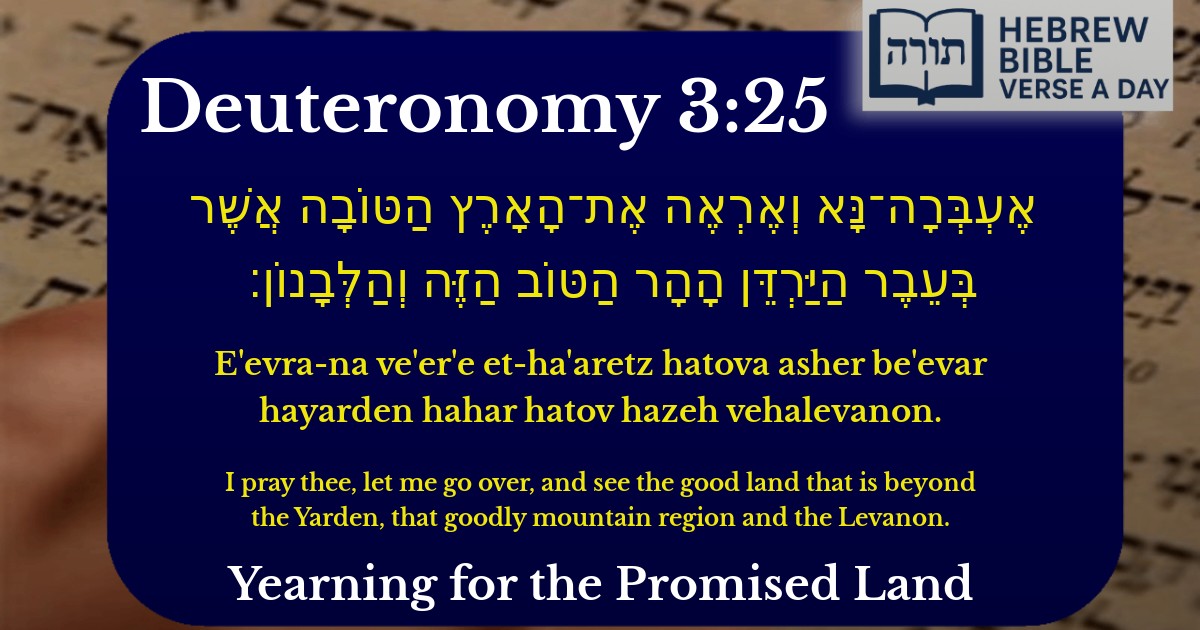Frequently Asked Questions
Q: What is Moshe asking for in Deuteronomy 3:25?
A: In this verse, Moshe is pleading with Hashem to allow him to cross the Jordan River and enter Eretz Yisrael (the Land of Israel). After leading the Jewish people for 40 years, he deeply desired to see the holy land before his passing, as Rashi explains on this verse.
Q: Why wasn't Moshe allowed to enter Israel?
A: According to the Torah (Devarim 32:51) and explained by Rambam in Hilchot Teshuvah, Moshe was not permitted to enter Israel because of the incident at Mei Merivah (Numbers 20), where he struck the rock instead of speaking to it as commanded. This was considered a slight deviation from Hashem's exact instructions.
Q: What is the significance of Moshe calling Israel 'the good land'?
A: The Talmud (Ketubot 112a) teaches that Eretz Yisrael is called 'the good land' because it possesses special spiritual qualities. The Midrash (Sifrei Devarim) explains that it is 'good' in its mitzvot (commandments), as many can only be performed there, and 'good' in its physical blessings when the Jewish people follow Torah.
Q: What can we learn from Moshe's request to see Israel?
A: The Sages learn from this that even great leaders like Moshe had human yearnings - in this case, a deep love for Eretz Yisrael. Ramban explains this teaches us the importance of valuing the land Hashem promised to our ancestors, and how we should always strive to connect with our heritage and homeland.
Q: What are 'the goodly mountain' and 'Levanon' referring to in this verse?
A: Rashi explains that 'the goodly mountain' refers to Yerushalayim (Jerusalem), while 'Levanon' refers to the Beit Hamikdash (Temple). The Talmud (Yoma 39b) notes that the Temple is called Levanon (meaning 'white') because it whitens (purifies) the sins of Israel through the sacrificial service.


Context in Devarim (Deuteronomy)
The verse (Devarim 3:25) records Moshe Rabbeinu's plea to Hashem to enter Eretz Yisrael after being told he would not cross the Yarden due to the incident at Mei Merivah (Bamidbar 20:12). This request reflects Moshe's deep yearning to see the Land promised to Avraham, Yitzchak, and Yaakov.
Rashi's Explanation
Rashi (Devarim 3:25) explains that Moshe was not challenging Hashem's decree but rather making a heartfelt request, using the term "נָּא" ("please") to emphasize his humility. Rashi also notes that Moshe specifically mentions "הָהָר הַטּוֹב" ("that goodly mountain")—referring to Yerushalayim—and "הַלְּבָנוֹן" ("the Levanon"), which alludes to the Beit HaMikdash (as the cedar wood from Lebanon was used in its construction).
Rambam's Perspective
In Moreh Nevuchim (1:54), Rambam discusses Moshe's request as an example of a tzaddik's desire for spiritual elevation. Entering Eretz Yisrael would have allowed Moshe to fulfill mitzvot hateluyot ba'aretz (commandments dependent on the Land) and bring the nation to greater kedushah.
Midrashic Insights
Theological Significance
The request underscores the centrality of Eretz Yisrael in Jewish thought. As the Ramban (Devarim 4:21) explains, the Land is the ideal setting for fulfilling Torah and achieving closeness to Hashem. Moshe's unfulfilled wish also serves as a lesson in accepting divine decrees with humility, as he ultimately affirms Hashem's justice (Devarim 3:26).